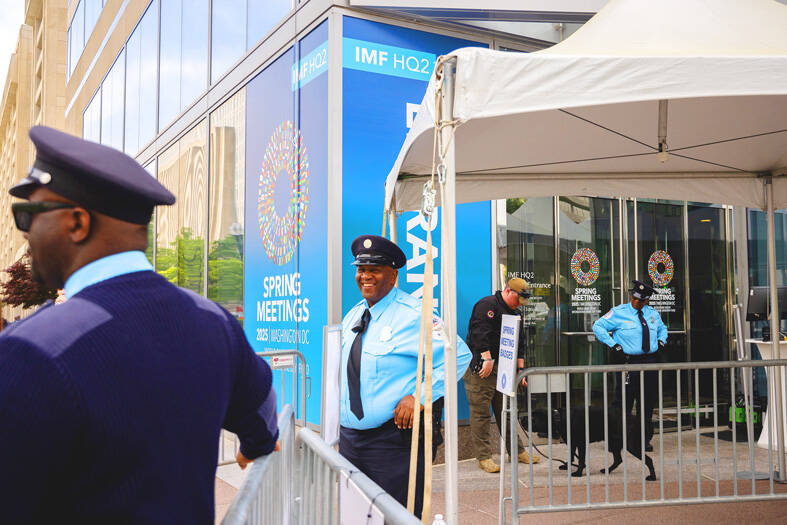The IMF said Asian central banks generally have room to lower interest rates to support domestic demand and offset the impact of the escalating global trade war, with the region in much stronger shape than before the Asian financial crisis.
Inflation in the region is at par or even below central banks’ target ranges, which should allow more monetary easing, IMF Asia and Pacific Department director Krishna Srinivasan said yesterday.
While that could weaken currencies, especially if rates in the US stay higher for longer, “what we are advising countries is to let the exchange rate be the shock absorber, and let monetary policy provide you space you need to adjust” to the tariff shock, he said.

Photo: EPA-EFE
The recommendation comes as US President Donald Trump’s tariffs threaten to slow the global economy, with the export-driven Asian region set to be among the hardest hit. The IMF expects Asia’s economy to grow just 3.9 percent this year and 4 percent next year, as it deals with a “double whammy” from weaker external demand and higher US tariffs, Srinivasan said.
That represents a cumulative downgrade of 0.8 percentage points from the IMF’s earlier forecasts, its sharpest adjustment since the COVID-19 pandemic, he said, adding that the new forecasts face “significant downside risks,” depending on the outcome of trade negotiations with the US.
On the plus side, the region’s fundamentals are “much, much better” than during the 1997 to 1998 Asian financial crisis, when the IMF bailed out Indonesia, South Korea and Thailand, Srinivasan said.
Differences include credible policy frameworks, independent central banks and less currency mismatch in their balance sheets, he added.
The IMF urged Asia to look toward its domestic economy to drive growth, and undertake the necessary structural reforms to stimulate consumption and investment that remain soft compared with pre-COVID-19 levels.
Lower borrowing costs should help bolster demand and lift countries out of deflationary territory, such as China and Thailand. Any fiscal support should be “targeted and time-bound” since budget deficits remain high post-COVID-19, Srinivasan said.

Sweeping policy changes under US Secretary of Health and Human Services Robert F. Kennedy Jr are having a chilling effect on vaccine makers as anti-vaccine rhetoric has turned into concrete changes in inoculation schedules and recommendations, investors and executives said. The administration of US President Donald Trump has in the past year upended vaccine recommendations, with the country last month ending its longstanding guidance that all children receive inoculations against flu, hepatitis A and other diseases. The unprecedented changes have led to diminished vaccine usage, hurt the investment case for some biotechs, and created a drag that would likely dent revenues and

Macronix International Co (旺宏), the world’s biggest NOR flash memory supplier, yesterday said it would spend NT$22 billion (US$699.1 million) on capacity expansion this year to increase its production of mid-to-low-density memory chips as the world’s major memorychip suppliers are phasing out the market. The company said its planned capital expenditures are about 11 times higher than the NT$1.8 billion it spent on new facilities and equipment last year. A majority of this year’s outlay would be allocated to step up capacity of multi-level cell (MLC) NAND flash memory chips, which are used in embedded multimedia cards (eMMC), a managed

CULPRITS: Factors that affected the slip included falling global crude oil prices, wait-and-see consumer attitudes due to US tariffs and a different Lunar New Year holiday schedule Taiwan’s retail sales ended a nine-year growth streak last year, slipping 0.2 percent from a year earlier as uncertainty over US tariff policies affected demand for durable goods, data released on Friday by the Ministry of Economic Affairs showed. Last year’s retail sales totaled NT$4.84 trillion (US$153.27 billion), down about NT$9.5 billion, or 0.2 percent, from 2024. Despite the decline, the figure was still the second-highest annual sales total on record. Ministry statistics department deputy head Chen Yu-fang (陳玉芳) said sales of cars, motorcycles and related products, which accounted for 17.4 percent of total retail rales last year, fell NT$68.1 billion, or

In the wake of strong global demand for AI applications, Taiwan’s export-oriented economy accelerated with the composite index of economic indicators flashing the first “red” light in December for one year, indicating the economy is in booming mode, the National Development Council (NDC) said yesterday. Moreover, the index of leading indicators, which gauges the potential state of the economy over the next six months, also moved higher in December amid growing optimism over the outlook, the NDC said. In December, the index of economic indicators rose one point from a month earlier to 38, at the lower end of the “red” light.